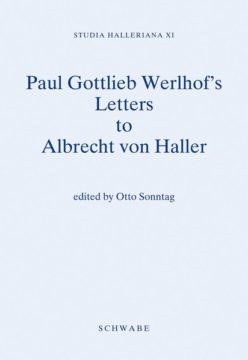The Swiss polymath Albrecht von Haller was at the center of a vast eighteenth-century correspondence network. The most voluminous, by far, of his correspondences was with Paul Gottlieb Werlhof (1699–1767), an eminent and learned physician and author in Hanover. It begins in October 1736, shortly after Hallerʼs arrival in Göttingen as professor at the two-year-old university there, and ends in June 1767, fourteen years after Haller’s return to Bern and several weeks before Werlhof’s death. Haller’s letters to Werlhof were all destroyed, but their gist can often be inferred from Werlhof’s replies, which merit their own attention.
The 1,574 letters presented in this edition constitute a rich, still largely untapped source for the life, character, career, and thought of not just their author but also their recipient. The two men spoke freely about their personal joys and sorrows, hopes and fears. They discussed concerns regarding their families, finances, and health. Werlhof proved himself ever ready to advise, console, encourage, and assist his friend.
The letters range broadly and knowledgeably over the medical, scientific, and literary developments of the time. They follow closely the productions, personalities, and controversies of the so-called republic of letters, especially those that involved Haller. On many occasions they also focus on the political and military affairs of the day.
Of special interest is the light shed on the early history of the University of Göttingen, its facilities and finances, professors and students, pedagogy and discipline, rivalries and quarrels. Werlhof regularly served as an intermediary between Haller and Gerlach Adolph von Münchhausen, the universityʼs forceful first curator, who figures prominently in the correspondence.
Among the many other appealing aspects of the letters are Werlhofʼs detailed critiques of Haller’s poems, their language, and their ideas, particularly when Haller was preparing new editions of his Versuch Schweizerischer Gedichten.
- Veröffentlicht am Donnerstag 22. Mai 2014 von Schwabe Basel
- ISBN: 9783796528620
- 2373 Seiten
- Genre: Belletristik, Briefe, Tagebücher
